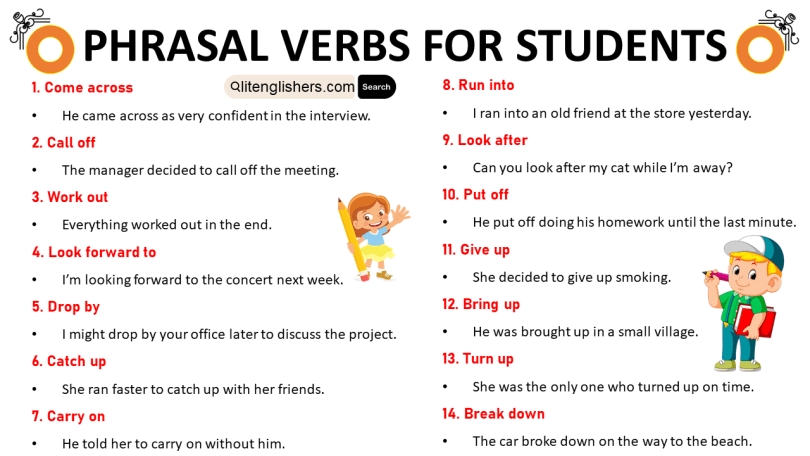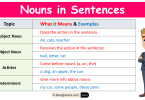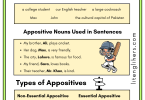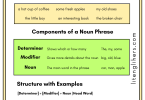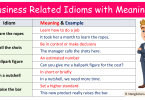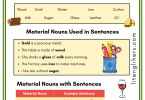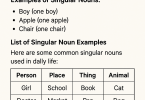Phrasal verbs are phrases that combine a verb with one or more particles (usually prepositions or adverbs) to create a new meaning. For example, “look after” means to take care of someone or something. The verb “look” and the preposition “after” together have a different meaning than “look” by itself.
Phrasal verbs are important because they are used a lot in everyday English. Understanding and using them will help you speak and understand English better.
Phrasal Verbs with Meaning
Here are some common phrasal verbs you might come across:
- Pick Up: To lift something from the ground or to collect someone.
Example: Can you pick up the kids from school today?
- Turn Off: To stop a machine or light.
Example: Don’t forget to turn off the lights when you leave.
- Put On: To wear clothes or accessories.
Example: It’s cold outside, so put on your jacket.
- Look For: To search for something or someone.
Example: I am looking for my keys. Have you seen them?
- Give Up: To stop trying or to quit.
Example: Never give up on your dreams.
- Run Out Of: To use all of something so there is none left.
Example: We have run out of milk. Can you buy some?
- Turn On: To start a machine or light.
Example: Can you turn on the TV, please?
- Get Up: To rise from bed or a sitting position.
Example: I get up at 7 AM every morning.
- Take Off: To remove clothes or accessories, or for a plane to leave the ground.
Example: The plane will take off at 9 PM.
- Look After: To take care of someone or something.
Example: I look after my little sister when my parents are not home.
Phrasal Verbs with Example Sentences
Here are some common phrasal verbs along with example sentences:
- Come across
While cleaning the attic, she came across an old photo album.
He came across as very confident in the interview.
- Call off
The manager decided to call off the meeting.
Due to the weather, they had to call off the picnic.
- Work out
Everything worked out in the end.
He works out at the gym every morning.
- Look forward to
I’m looking forward to the concert next week.
She looked forward to her birthday every year.
- Drop by
I might drop by your office later to discuss the project.
We decided to drop by a friend’s house on our way home.
- Catch up
She ran faster to catch up with her friends.
I need to catch up on my reading.
- Carry on
Despite the interruptions, she carried on with her presentation.
He told her to carry on without him.
- Run into
I ran into an old friend at the store yesterday.
She ran into some trouble while completing the project.
- Look after
She looks after her younger siblings while her parents are at work.
Can you look after my cat while I’m away?
- Put off
He put off doing his homework until the last minute.
The meeting was put off due to unforeseen circumstances.
- Give up
She decided to give up smoking.
After several failed attempts, he gave up.
- Bring up
She brought up an interesting point during the meeting.
He was brought up in a small village.
- Turn up
She was the only one who turned up on time.
They turned up the heat because it was cold.
- Break down
The car broke down on the way to the beach.
After hearing the bad news, she broke down and cried.
- Turn down
She turned down the job offer.
They turned down the music because it was too loud.
- Figure out
I need to figure out how to solve this problem.
She finally figured out the answer to the puzzle.
- Make up
They made up after their argument.
She made up an excuse for being late.
- Take after
She takes after her mother in both looks and personality.
He really takes after his grandfather.
Download a free PDF Book of this lesson:
YOU MAY ALSO LIKE
- Basic Vocab English PDF Book
- 50 Common Synonyms Words in English
- ADVANCED VOCABULARY LIST
- Tips to improve vocabulary
